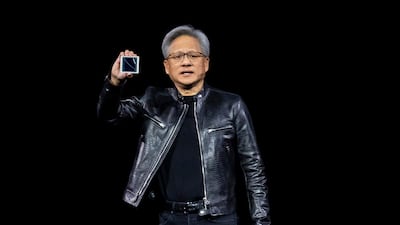Nvidia has unveiled its newest generation of artificial intelligence chips, as the US chipmaker aims to solidify its position amid the generative AI boom.
The Blackwell processor will begin shipping later in 2024 and is up to five times more powerful than its predecessor, Hopper, chief executive Jensen Huang said at the company's GTC conference in San Jose, California, on Monday.
Nvidia said the Blackwell delivers up to 20 petaflops of performance, compared to Hopper's 4 petaflops. A petaflop is equivalent to one quadrillion operations per second.
The Blackwell's architecture comprises 208 billion transistors, compared to the Hopper's more than 80 billion, and can support trillions of parameters for training large language models, the underlying technology powering generative AI.
“This is the most advanced GPU in the world in production today. The excitement of Blackwell is really off the charts,” Mr Huang said in his keynote, referring to graphics processing units.
GPUs perform technical calculations faster and with greater energy efficiency than traditional central processing units.
Nvidia plans to package the Blackwell chips into larger setups. For instance, the GB200 NVL72, presented at the event, is made up of 36 CPUs and 72 GPUs, totalling 720 petaflops of AI power, in addition to more than 3.2km of cables.
The Blackwell, which will be combined with Nvidia's central processing unit Grace, also puts two circuit boards together to make it appear that “it's just one chip”, Mr Huang said.
During his address, Mr Huang held up the two chips side-by-side, with the Blackwell appearing to be about twice the size of its predecessor.
“There's no memory locality issues, no cache issues. It's just one giant chip."
Mr Huang said the latest superchips – which he declared would be “the most successful product launch in our history” – can be installed by simply sliding out the Hopper units from existing infrastructure.
“Hopper is fantastic but we need bigger GPUs,” he said, referring to graphics processing units.
Nvidia did not disclose the price of the new Blackwell GPUs. Hopper chips cost between $25,000 to $40,000 each, with entire systems priced as much as $200,000, industry estimates have shown.
Among the major technology companies expected to adopt Blackwell technology are Amazon Web Services, Dell Technologies, Google, Meta Platforms, Microsoft, Oracle, Elon Musk's Tesla and xAI, and OpenAI, the maker of ChatGPT, Nvidia said.
AWS, the cloud computing unit of the world's biggest e-commerce platform Amazon, and Nvidia announced they are extending their collaboration to advance generative AI innovation using Blackwell.
“Nvidia's next-generation Grace Blackwell processor marks a significant step forward in generative AI and GPU computing,” said Adam Selipsky, Amazon Web Services' chief executive.
The companies said they would accelerate AI innovation across health care and life sciences.
Sam Altman, chief executive of OpenAI, said the Blackwell "will accelerate our ability to deliver leading-edge models".

Nvidia's chips are central components in generative AI, with several of the technology industry's biggest names making moves to boost their investments, indicating that the frenzy for the much-hyped sector isn't slowing down anytime soon.
This has taken Nvidia shares to record levels: its stock has soared about 242 per cent over the past 12 months and its market capitalisation has surpassed the highly exclusive $2 trillion mark, putting it behind only Apple and Microsoft.
Even companies acquired by Nvidia are enjoying the AI-fuelled fame – especially after it disclosed its stakes in them last month.
Nvidia's latest product also focuses on power efficiency. The company said 2,000 Blackwell GPUs consume 4 megawatts of power, compared to 15 megawatts for 8,000 Hopper GPUs.
"Accelerated computing has reached the tipping point; general purpose computing has run out of steam," he said.
"We need another way of doing computing so that we can continue to scale [and] drive down the cost of computing, so that we can continue to consume more and more computing while being sustainable."


